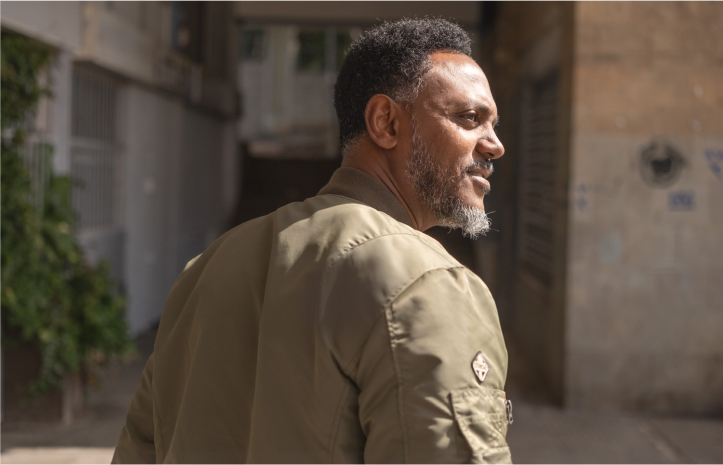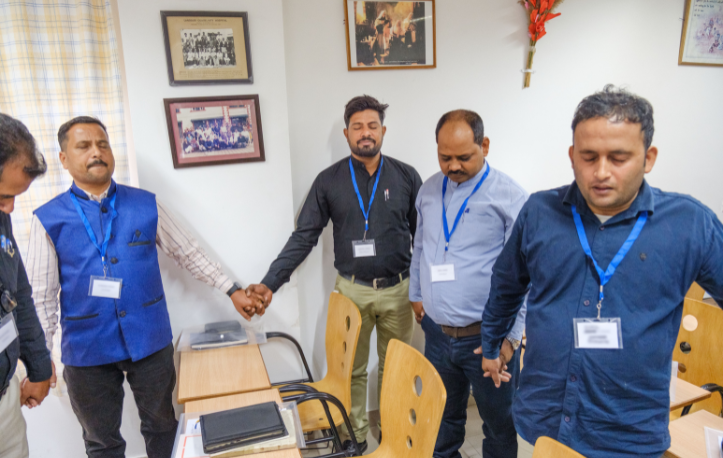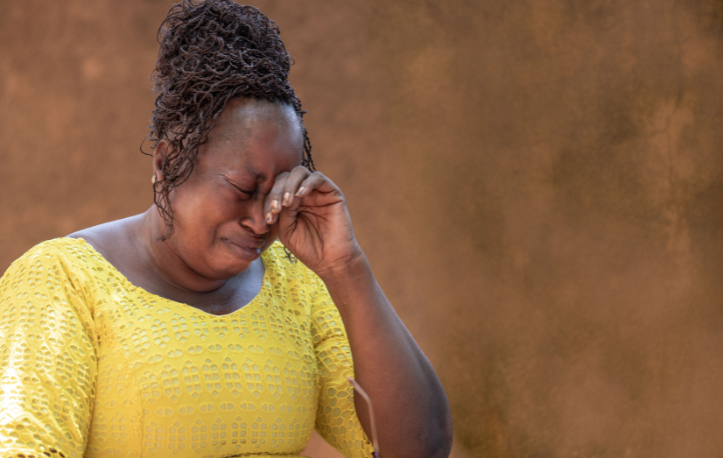Obadiah hated Christians for the way they treated his family.
In their Ethiopian Jewish community, which had existed for centuries, they were completely rejected by their Orthodox Christian neighbours.
“[Our neighbours] called us falasha,” he said, explaining the epithet’s meaning as ‘strangers’, ‘foreigners’ or ‘people who came into the country and didn’t belong there’. Sometimes Obadiah and his family were called even worse names.
His mother urged him to keep a low profile. “Don’t share what we are,” she warned. “You don’t need to say that we are Jewish. Keep it to yourself.”
The name-calling was painful for Obadiah as a child, but verbal abuse wasn’t the only mistreatment his family received. “My oldest brother, they beat him many times … because he was Jewish,” he said. In 1984, at age 16, Obadiah’s brother fled to nearby Sudan on foot, hoping to one day reach safety in Israel.
While his mother and other siblings also wanted to immigrate to Israel, it was sometimes prohibited by the Ethiopian government. “We need to pray that one day we will live in Jerusalem,” his mother said.
Finally, in 1991, their prayers were answered. During one 36-hour period, the Israeli government flew more than 14,000 Ethiopian Jews to Israel on crowded military transport planes. “They took out all the seats,” Obadiah recalled. “They put maybe 400, 500 people in the aeroplane.”
The family rejoiced when they landed. “I still remember we just celebrated all night,” Obadiah said. “It was a dream come true.”
New Realities
The Israeli government sent 12-year-old Obadiah to a yeshiva, a traditional Jewish school where students study religious texts. Though he at first thought the religious studies would help him become a rabbi, like his grandfather, he grew uninterested in religious education; he felt it focused too much on rabbinical teachings.
He also began to feel the sting of discrimination again, this time based on his skin colour rather than his religion. “I was Jewish in Ethiopia, but I am a black person in Israel,” he said, recalling how he was ostracised by other students. “I started to feel that I am nothing.”
Disillusioned, Obadiah transferred to a different school and then completed three years of mandatory military service. As the life he had dreamed of failed to materialise, he turned away from God.
“Something inside me was empty,” he said. “I became alcohol addicted and I lost my way at that time.”
One day, not long after completing his military service, some men approached and began talking to him about the purpose of life. When they asked Obadiah what he thought of the Messiah, he replied that there were many theories; some rabbis thought one thing, some another. The men told him that they knew who the Messiah was, and they began talking about Yeshua (Hebrew for Jesus).
When Obadiah realised the men were Christians, he became furious. He never expected anyone in Israel to talk about Jesus. “I was so angry,” he said. “Just to hear the name brought up all the suffering that we had in Ethiopia, the persecution that we had there.”
As Obadiah started yelling at the men, a crowd began to gather and the Christians left. Obadiah was so shaken by the encounter that it took hours for him to calm down.
Turning Point
While walking down a street in Nazareth, Obadiah saw an advertisement that asked, “Why don’t you read Isaiah 53 in the synagogue?” Obadiah had wondered as well.
Christians believe that Isaiah 53, which describes the ‘suffering servant’, points directly to Christ as the Messiah. But Obadiah said Jews call it the ‘forbidden chapter’ and completely skip over it. He decided to ask several rabbis why the chapter is disregarded.
One rabbi told him that Isaiah 53 is a mystery. “We are waiting for the Messiah to give us the understanding of that chapter,” the rabbi said. Then he warned Obadiah that Christians might use it to convert him. Finding that answer unsatisfactory, Obadiah consulted a chief rabbi, who condescendingly told him that he might understand when he reached age 40.
Since he couldn’t get an answer from the rabbis, Obadiah decided to ask some Christians about the chapter. They explained the belief that Isaiah 53 is a prophecy of Jesus Christ as the Messiah, and before parting they invited Obadiah to a Christian conference.
While listening to a pastor read from the New Testament during the conference, Obadiah understood nothing. “The first evening I didn’t feel anything,” he said. “I even thought that these people who believe in Jesus are mad.”
At one point the pastor invited people to come forward for prayer, but Obadiah didn’t want to go. Then, an older woman approached him and said, “It’s your day; you have to go forward.” Obadiah had been taught to honour his elders, so after she asked three times, he relented.
“Why are you here today?” the pastor asked him. Though surprised by such a direct question, Obadiah immediately replied, “I want to know the right Messiah of the Jews.”
The pastor told Obadiah that if he prayed, God Himself would reveal it to his heart. So Obadiah bowed in a traditional Jewish mode of prayer and raised his hands to God. “That was the moment that changed my life,” he said.
Obadiah began crying and couldn’t stop. “Inside me, I felt a peace, a strong peace, shalom,” he said. “The Holy Spirit told me, ‘Yeshua is the Messiah. Yeshua is the Saviour’.”
Without further hesitation, he began to study the Bible and tell others about his new faith. But when he shared his testimony with other students in his university cafeteria one day, another student started yelling that he was going to kill him.
Obadiah immediately prayed for the young man. “That person was delivered from a demonic spirit,” he said. “He came to faith, but many people came against me.” Because of the commotion in the cafeteria, Obadiah was temporarily suspended from the university.
A Pastor under Constant Pressure
Obadiah soon sensed the Lord calling him to ministry work. After completing Bible college, he eventually started a church to help Ethiopian Jews learn about the Messiah, Jesus Christ. While some have been open to his message, many have not.
In the past two years alone, more than two dozen young Ethiopian Jews have been forced out of their homes by family members for placing their faith in Christ. Obadiah has helped them find safe places to live while continuing to provide biblical discipleship. But both he and the new Christians receive frequent threats.
“We have ultra-Orthodox Ethiopian Jews in the land,” Obadiah said. “They are so fanatical. They send messages saying, ‘We will kill you!’”
Sometimes their threats breed violence. During a church service in 2022, a group of ultra-Orthodox Ethiopian Jews stormed into Obadiah’s church and attacked him while he was preaching. “They came and beat me in the time of ministry,” he said. “Thank God there were some young people who took them very fast. They took them outside, and we called the police.”
Obadiah’s car has also been vandalised. Because of the attacks, constant threats and community pressure, he worries about the safety of his wife and children. But he says he will continue to point people to Christ. “God knows everything,” he said. “He is our hope and He is our protection, so I cannot stop doing this ministry because of fear.”
The civil unrest and violence occurring in and around Israel have caused widespread fear and hopelessness in Obadiah’s community. However, it has also provided opportunities to share the gospel. “The pain is really hard in the land,” he said, “but also it brings many people to ask about God.”
Among them, he said, are three Ethiopian Jewish families who have recently come to faith in Christ. One family had a son in the army who witnessed a friend’s death. “I met [their son], and I shared about the love of Yeshua,” Obadiah said. “He was so depressed. His family came together with him and accepted Yeshua. They joined the kingdom.”
Obadiah has a strong desire to see more members of his Ethiopian community join God’s kingdom. He requests prayer for his protection and for more gospel workers. He also asks for prayer that his church will clearly demonstrate God’s love to Ethiopian Jews who have lost hope.




Submit a Prayer